About Over Haddon Parish Council
This page provides details about Over Haddon Parish Council, its members and its meetings – including the authority’s Annual Parish Meeting. The website also contains details of council meeting agendas and minutes, as well as contact details for each parish councillor.
Over Haddon Parish Council is made up of a total of five members. All members have equal voting rights on matters across the whole parish, with the exception of the chair of the meeting – who has an additional casting vote in the event of a tie.
Members are elected for four years at a time. Vacancies which occur between elections are filled through by-elections (if requested) or co-option. The chair and vice-chair are elected by members at the annual meeting of the parish council in May each year.
The parish council meets once every two months, with meetings currently held in the months of May, July, September, November, January and March,. The authority may, however, also meet at other times giving notice.
The rules of the parish council are set out in its standing orders and financial regulations.
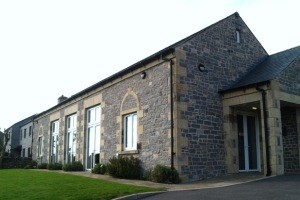
The council meets at the Over Haddon Village Hall.
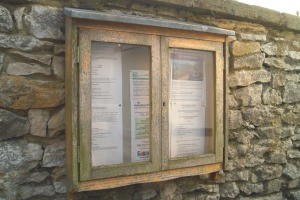
The council noticeboard.
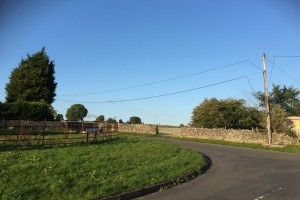
The village of Over Haddon.
Meetings
Over Haddon Parish Council meetings take place in Over Haddon Village Hall, in School Lane. All meetings start at 8pm, unless the agenda states otherwise.
The parish council meeting dates are published on the Agendas and Minutes page.
Meetings are confirmed for the following parish year at the Annual Parish Meeting but are most often the second Monday of the month. Agendas and minutes from each parish council meeting are posted regularly on the authority’s noticeboard, located in Main Street.
Annual Parish Meeting
The Annual Parish Meeting is not a council meeting. It is a meeting of the people living in the village of Over Haddon, known as the parish electors. Strictly speaking, electors can set the agenda and, in practice, these meetings often celebrate local activities and debate current issues in the community. The Over Haddon Parish Council chairman calls the Annual Parish Meeting and, if present, will chair it.
Assets, activities and responsibilities
Over Haddon Parish Council has several formal powers and responsibility for numerous assets, including:
- Providing and maintaining the parish council-owned allotments which are available to rent by local parishioners. These are located off Monyash Road.
- Overseeing the Derbyshire Dales District Council-owned public toilet block, situated in the car park off Main Street, and providing a cleaner to ensure they remain open all-year round to visitors to nearby Lathkill Dale.
- Maintaining the parish council-owned bus shelter, in Monyash Road.
- Looking after the village’s two noticeboards, which contain details of parish council agendas and minutes.
- Maintaining the village’s historic war memorial, in Main Street, as well as the village pump (not currently in working use), in Wellgate Lane.
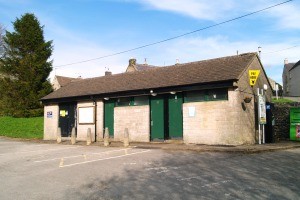
The toilet block.
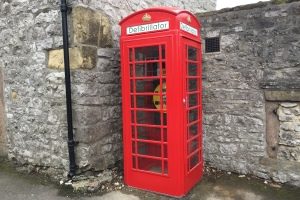
The village defibrillator.
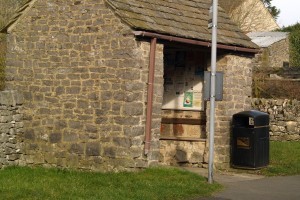
The bus shelter.
The parish council has taken on the maintenance of the K6 (listed) telephone kiosk, in Main Street, and, following restoration by volunteers, it now houses the Community Heartbeat Trust defibrillator – which has been paid for by the community’s fund-raising efforts and donations, with the assistance of a grant from our three district councillors.
Over Haddon Parish Council is able to carry out the above responsibilities and maintain the above assets through the precept. This is the local tax on parishioners, which is the authority’s only source of income and is usually set at the November meeting. Parish councils have the power to improve the quality of community life by spending sums of money in ways which, in the opinion of its members, are in the interests of the parish or its inhabitants. The accounts are formally audited every year and will be published on this website by the end of July following the March year-end.
The authority is also the first point of call for local consultation on matters such as planning applications and district council strategic planning. Members of the parish council can represent the views of the village to other authorities, including the Peak District National Park Authority, as well as district and county councils. They are entitled to be consulted on planning applications and can state the parish’s case at public inquiries.
